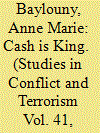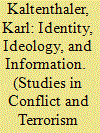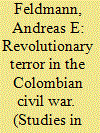|
|
|
Sort Order |
|
|
|
Items / Page
|
|
|
|
|
|
|
| Srl | Item |
| 1 |
ID:
164592


|
|
|
|
|
| Summary/Abstract |
The role of resources in war has been much debated. What happens when foreign patrons provide lavish amounts of cash to rebels, without mechanisms of accountability? This article analyzes three major sources of funding and their micro-level effects on insurgent-groups in the Syrian civil war. Recipients of funding demonstrated opportunism in actions, alliances, and ideologies, directly related to the funding source. Funders thus set the agenda of the war, promoting Islamist ideologies and regional over local issues. Private donors rivaled state sponsors, in what may be a harbinger of future globalization trends.
|
|
|
|
|
|
|
|
|
|
|
|
|
|
|
|
| 2 |
ID:
164589


|
|
|
|
|
| Summary/Abstract |
Jihadist foreign fighters are frequently described as non-state actors whose prominence challenges the traditional, state-dominated international system and our understanding of it. In practice, however, foreign fighters rely heavily on the very states they reject. Some of the most important foreign fighter movements in the world today receive massive and explicit state support, while still others rely on states to tolerate their fund-raising, transit, recruitment, and other core activities. Yet the scope, scale, and nature of this reliance varies tremendously, as does its overall impact. To stop or at least limit these flows, it is vital to change the policies and capacities of these state backers.
|
|
|
|
|
|
|
|
|
|
|
|
|
|
|
|
| 3 |
ID:
164584


|
|
|
|
|
| Summary/Abstract |
This article explores the amount and sources of support for the Islamic State among Iraqis. We argue that, in addition to shared identity and ideology, a neglected factor in debates about support for Islamist militancy is the messaging and information that individuals receive about a given group. We test these arguments using regression analysis on public opinion data collected in Iraq in April 2015. The analyses largely support our contentions, showing that exposure to news coverage of the Islamic State in Iraq and the Levant substantially reduces support for the group, even among alienated Sunnis or ideological Islamists.
|
|
|
|
|
|
|
|
|
|
|
|
|
|
|
|
| 4 |
ID:
164590


|
|
|
|
|
| Summary/Abstract |
This article offers a bottom-up understanding of the media strategy employed by the Islamic State of Iraq and the Levant (ISIL) as it relates to the production and dissemination of its hostage execution videos. Through an empirical analysis of sixty-two videos of executions produced by ISIL in the year following its establishment as the “Islamic State” in 2014, this study examines the videos as a major component of ISIL's media strategy. Through these media products, ISIL seeks to spread a political message aimed at both local and global, ingroup and outgroup consumption through audience segmentation, while striving to influence both local and global audiences through the use and production of graphic violence. This article also discusses the strategy governing the production and release of ISIL's execution videos; how it relies on the global media to transmit its intertwined political and religious agenda in the digital media age.
|
|
|
|
|
|
|
|
|
|
|
|
|
|
|
|
| 5 |
ID:
164586


|
|
|
|
|
| Summary/Abstract |
Using a dataset of more than 80 accounts during 2015, this article explores the gendered ways in which self-proclaiming Twitter Islamic State of Iraq and Syria (ISIS) supporters construct community around “suspension.” The article argues that suspension is an integral event in the online lives of ISIS supporters, which is reproduced in online identities. The highly gendered roles of ISIS males and females frame responses to suspension, enforcing norms that benefit the group: the shaming of men into battle and policing of women into modesty. Both male and female members of “Wilayat Twitter” regard online as a frontline, with suspension an act of war against the “baqiya family.” The findings have implications for broader repressive measures against ISIS online.
|
|
|
|
|
|
|
|
|
|
|
|
|
|
|
|
| 6 |
ID:
164587


|
|
|
|
|
| Summary/Abstract |
More than 15 years have passed since the terrorist attacks of 11 September 2001, and a comprehensive re-examination of the 9/11 attackers is now warranted. Research on the psychology of terrorists has evolved dramatically, and there is also new information on some offenders. The present study provides the available psychological and psychiatric evidence on each of the 9/11 pilots, muscle hijackers, and thwarted hijackers who intended to participate in the “planes operation.” Overall, findings suggest that the 9/11 terrorists may have had significantly more mental health problems than previously assumed, and the leaders who planned 9/11 personally approved suicide attackers with prior histories of mental illness. By widely publicizing this information, security officials may be able to more effectively delegitimize suicide terrorism and reduce the number of individuals who would consider funding, supporting, or committing these deadly attacks.
|
|
|
|
|
|
|
|
|
|
|
|
|
|
|
|
| 7 |
ID:
164585


|
|
|
|
|
| Summary/Abstract |
This article investigates the use of terror in Colombia's civil war by examining the behavior of the Revolutionary Armed Forces of Colombia (FARC) and the National Liberation Army (ELN). Relying on an extensive database covering 25 years of conflict, the article traces the way in which the FARC and ELN have employed terror as part of their overall insurrectional strategy. I argue that, while ideology plays an important role in inspiring revolutionary terrorism, these groups' terror practices evolved over time and were driven principally by military strategies. Changing conditions in the theater of war, particularly growing competition with paramilitary forces, in turn, influenced these strategies. The article also discusses some interesting differences between the two groups' terror practices.
|
|
|
|
|
|
|
|
|
|
|
|
|
|
|
|
| 8 |
ID:
164591


|
|
|
|
|
| Summary/Abstract |
This article considers the terrorism financing risk associated with the growth of Financial Technology innovations and in particular, focuses on virtual currency products and services. The ease with which cross-border payments by virtual currencies are facilitated, the anonymity surrounding their usage, and their potential to be converted into the fiat financial system, make them ideal for terrorism financing and therefore calls for a coordinated global regulatory response. This article considers the extent of the risk of terrorism financing through virtual currencies in “high risk” States by focusing on countries that have been recently associated with terrorism activities. It assesses the robustness of their financial regulatory and law enforcement regimes in combating terrorism financing and considers the extent to which Regulatory Technology and its global standardization, can mitigate this risk.
|
|
|
|
|
|
|
|
|
|
|
|
|
|
|
|
| 9 |
ID:
164588


|
|
|
|
|
| Summary/Abstract |
Lone actor terrorism has become a significant challenge for Western democracies. Previous studies have failed to point out a comprehensive profile of lone terrorists, and suggested that examining more specific sub-groups of lone actors, sharing contextual factors or ideology, may produce such a profile. The current study examines the sub-group of vehicle-borne lone terrorists, who committed their attacks in Israel and the West Bank between January 2000 and March 2016. Based on confidential and open-source data, we find that general sociodemographic characteristics did not produce a unique profile of attackers. However, a deeper examination of behavioral factors preceding the attack yields common traits. Specifically, we find that previous experience—both in different forms of unlawful behavior and in training related to the attack method—was significantly related to a successful attack. Similarities in regards to the triggers for the attack and personal motivations also emerge, suggesting that while operating independently, lone actors are very much influenced by ongoing events. We conclude that focusing on a sub-group of lone attackers following a spatio-methodological-oriented approach contributes to the construction of a profile for lone terrorists, and discuss these findings in the context of mitigation.
|
|
|
|
|
|
|
|
|
|
|
|
|
|
|
|
|
|
|
|
|